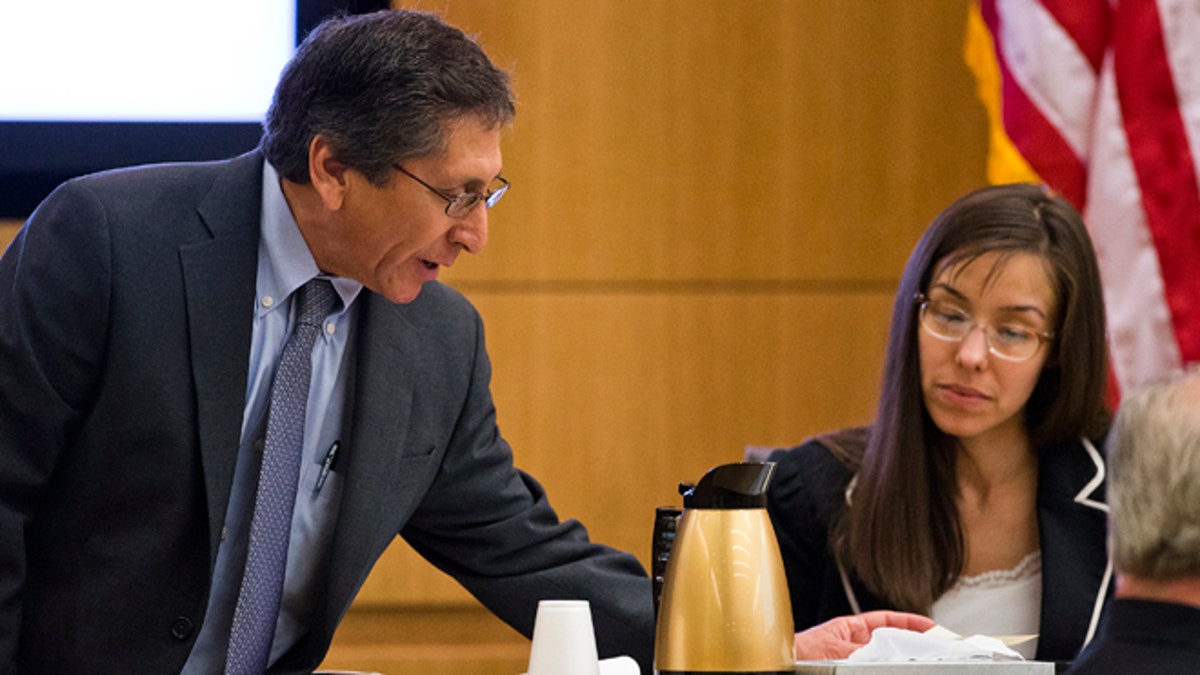
Prosecutor Juan Martinez asks defendant Jodi Arias a question about her diary during cross examination in Maricopa County Superior Court, Thursday, Feb. 21, 2013 in Phoenix. Arias, 32, faces a potential death sentence if convicted of first-degree murder in the June 2008 killing of Travis Alexander in his suburban Phoenix home. (AP Photo/The Arizona Republic, Tom Tingle, Pool) (AP2013)
During an intense cross-examination, Jodi Arias finally cracked Thursday – breaking down into tears and shielding her face with her hands as prosecutor Juan Martinez grilled the alleged murderess about the details of the night her ex boyfriend, Travis Alexander, was violently killed.
The homicide case, which has prosecutors pushing for a first degree murder conviction and death penalty, has captured national attention not just because of Arias’ pretty face, but because of the brutal manner in which her lover was murdered – he was stabbed 27 times, his throat was slit and he was shot in the forehead.
Arias, 32, is charged in the June 2008 killing of her lover in his suburban Phoenix home, where she said she was forced to fight for her life after Alexander attacked her. Police say she planned the killing in a jealous rage. Arias initially told authorities she had nothing to do with Alexander's death, then later blamed it on masked intruders before eventually admitting she did it.
Now, with the cross-examination in full swing, the focus of the trial has shifted to the battle between Arias and the bombastic, aggressive tactics employed by Martinez in questioning her – including gory details of the murder and intimate queries about her sexual relations with him.
I think the case is very strong against her and I would be shocked if she was found not guilty... His aggressive tactics, however, may give the jury a degree of sympathy for her that might keep her off death row.
“No one can accuse him of being anything but thorough or detail oriented,” said Arthur Aidala, a legal analyst and former prosecutor in New York.
According to the Phoenix New Times, Martinez has become a pariah among defense attorneys in the city “because he relentlessly plays hardball on the job.”
A graduate of Arizona State University, Martinez was licensed to practice law in 1984 and joined the Maricopa County Attorney's Office in 1988.
During Thursday’s cross-examination, Martinez launched a heated line of questioning about the day she allegedly killed her lover.
"Ma'am, were you crying when you were shooting him?" prosecutor Juan Martinez snapped.
"I don't remember," Arias replied, sobbing.
"Were you crying when you were stabbing him?" Martinez prodded.
"I don't remember," Arias said softly.
"How about when you cut his throat, were you crying then?" the prosecutor asked loudly, before Arias broke down.
Martinez’s antagonistic style has drawn praise and criticism from law experts following the case and the controversial prosecutor’s career. Some claim that his attacks are an attempt to show the other side of Arias from the sweet, innocent girl she portrayed in her direct examination, while others argue his insistent approach may actually be turning off the jury he wants to convince of Arias’ guilt.
“You don’t treat Jodi Arias like you would Charles Manson on the witness stand…," said Phoenix defense lawyer Melvin Macdonald. "While the crime may be just as gruesome, she’s a totally different person.”
The Arias case is not the first time that Martinez’s forceful approach to prosecuting has earned national attention.
In the 2009 murder trial of Doug Grant, the so-called “Mormon Murder Case,” Martinez made headlines for calling Grant the “Angel of Death” and tarring every witness the defense called in his behalf.
The Grant trial, which included tales of revelations from God, lust and religious overtones that would make good fodder for a Lawrence Wright book, ended in a manslaughter conviction.
Reports from the trial called Martinez “garrulous and relentless” and his closing arguments spanned two hours.
“He was so brash, so aggressive, he was like a German Shepherd attack dog all the time,” said Macdonald, who represented Grant during the trial.
Some experts argue that Martinez’s style has dragged the cross-examination on longer than it needed to go and that he could have effectively made his point in the first day or two without straining the concentration of the jury.
“I thought he did such a good job in the beginning of the cross-examination that there was no need to continue to do all this now,” Aidala said. “Five or six days is a very long time for a cross-examination and Martinez runs the risk of losing the interest of the jury.”
“Also, by this time most of the jury probably already has a pretty good idea of what they think,” he added.
Despite the hostility in the courtroom, some people close to the case believe that Martinez would probably succeed in obtaining a guilty verdict.
"When it comes to cross-examination, one size does not fit all," Steven Pitt, a forensic psychiatrist who has testified as an expert witness at many trials in the Phoenix area, told ABC News. "But if you set aside the incessant sparring, what the prosecutor I believe is effectively doing is pointing out the various inconsistencies in the defendant's version of events."







































